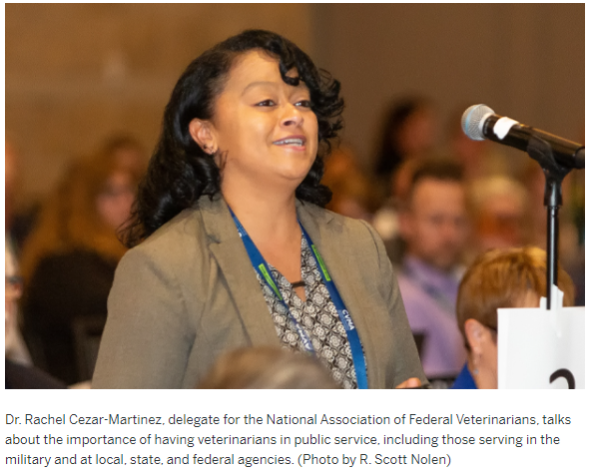AVMA acknowledges importance of public practice veterinarians

AVMA acknowledges importance of public practice veterinarians
By R. Scott Nolen

The AVMA House of Delegates (HOD) has requested that the AVMA issue a statement to the profession recognizing the importance of public practice to the entire veterinary community.
The National Association of Federal Veterinarians (NAFV), an HOD allied organization, introduced the resolution "New Policy on Recruiting and Retaining Public Practice Veterinarians" to bring greater awareness to its sector of the profession. It was approved by delegates Friday during the final day of the HOD's regular annual session, held July 13-14 in Denver in conjunction with AVMA Convention 2023.

The resolution reads as follows: "The AVMA recognizes the importance of public practice to the entire veterinary community. AVMA's Economics Division studied factors limiting private practice veterinarians from transitioning to public practice positions. Additional studies from AVMA and other veterinary organizations support efforts for recruitment and retention benefits from increased Congressional funding for all federal agencies' incentive programs such as the use of Special Pay (for specific hard to fill positions and locations), Specialty Pay (for Board Certification), Professional Pay (for pay equity with other medical professionals), removal of the annual salary cap in declared emergency disease outbreaks, student loan repayment bonuses and other incentives the agency deems appropriate to encourage more veterinarians to enter and remain in public practice."
The AVMA Board of Directors (BOD) and the House Advisory Committee (HAC) recommended delegates pass the resolution, which in the background information, asks the AVMA to pursue an updated General Accounting Office (GAO) assessment on the state of the federal veterinarian workforce.
In 2009, the GAO published the first assessment on the federal veterinary workforce titled, "Veterinary Workforce: Actions Are Needed to Ensure Sufficient Capacity for Protecting Public and Animal Health" (PDF). Since then, each report has come to similar conclusions of inadequate numbers to meet agency needs or emergency responses. Some federal agencies are experiencing veterinary position vacancy rates as high as 40% in some areas despite instituting recruitment and retention incentives.
The NAFV noted that new veterinarians are more likely to take higher paying jobs in private practice than work for the government. For instance, the mean starting salary in 2022 was $114,027 for private practice, compared with $87,862 for public practice, according to the NAFV.
A more comprehensive approach to filling the chronic void in federal veterinary services is needed, according to the NAFV, rather than the current inadequate patchwork of incentives. Significant new One Health challenges have arisen in the 15 years since the report was published, including COVID-19, resulting in a greater need for public practice veterinarians, the NAFV stated.
Dr. Rachel Cezar-Martinez, NAFV president and delegate, explained. "We hope this resolution provides immediate help and support from AVMA, state VMAs, and affiliated organizations to strengthen our voice in Congress so that regulatory veterinarians receive pay comparable to private and industry salaries."
